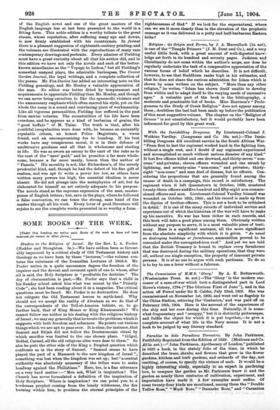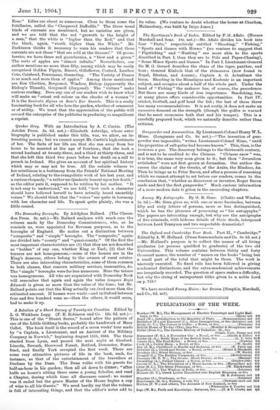Paradise in Sole Paradisus Terrestris. By John Parkinson, Faithfully Reprinted
from the Edition of 1629. (Methuen and Co. £2 2s. net.)—" John Parkinson, Apothecary of London," published in 1629 a book, in the stately folio of the time, in which he described the trees, shrubs, and flowers that grew in the flower gardens, kitchen and herb gardens, and orchards of the day, not omitting, of course, to specify the virtues of each. It would be a highly interesting study, especially to an expert in gardening lore, to compare the garden as Mr. Parkinson knew it and the garden as nearly three centuries of cultivation, experiment, and importation have made it. A few examples must suffice. Of roses twenty-four kinds are mentioned, among them the "Double Yellow Rose," "Musk Rose," " Damaske Rose," and "Carnation Rose." Lilies are about as numerous. Close to these come the fritillaries, called. the "Chequered Daffodils." The three usual kinds of currants are mentioned, but no varieties are given, and we are told that the red " groweth to the height of a man," that the white is "higher than the Red," and that the black, again, "riseth higher than the White." Mr. Parkinson thinks it necessary to warn his readers that these currants are not those "that are sold at the Grocers'." Of goose- berries, we have three red gooseberries, a "blew and a green." The sorts of apples are " almost infinite." Nevertheless, our author mentions no more than fifty, among which may be easily recognised Golden Pippin, Russet, Gilleflower, Costerd, Leather Cote, Cashew!, Pearemans, Genneting. "The Variety of Peares is as much and more than of apples." Among those mentioned are Bon Chretien, Bergomot, Windsor, Bishop (apparently the Bishop's Thumb), Gergonell (Jargonel). The "virtues" make curious reading. Does any one of our readers wish to know what will make an "orient red colour on the cheeke of a woman " ? It is the Sanicula Alpine or Bear's Ear Sanicle. This is a really fascinating book for all who love the garden, whether of ornament or of utility. We trust that the appreciation of the public will reward the enterprise of the publisher in producing so magnificent a reprint.











































 Previous page
Previous page